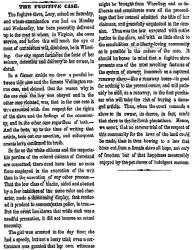Record Data
Transcription
THE FUGITIVE CASE.
The fugitive slave, Lucy, seized on Saturday, and whose examination was had on Monday and Wednesday, has been peaceably delivered up to the man to whom, in Virginia, she owes service, and before this will reach the eye of most of our readers will, doubtless, be in Wheeling. Our city report furnishes the facts of her seizure, detention and delivery to her owner, in detail.
In a former article we drew a parallel between this case and the famous Wellington rescue case, and claimed that the reason shy in the one case the law was obeyed and in the other case [violated?], was, that in the one case it was executed with due respect for the rights of the slave and the feelings of the community, and in the other case regardless of both. – And the facts, up to the time of writing that article, bore out our assertion, and subsequent events have confirmed its truth.
So far as the white citizens and the respectable portions of colored citizens of Cleveland are concerned, there need have been no more force employed in the execution of the writ than in the execution of any other process. – That the low class of blacks, aided and abetted by a few [illegible] of the same color and character, made a threatening display, that [illegible] it prudent to summon extra police, is true. – But the event has shown that while such was a needful precaution, it did not become an actual necessity.
The girls was arrested in the day time, she had a speedy, but not a hasty trial, even a continuance was granted that her own witnesses might be brought from Wheeling, and so deliberate and considerate were all the proceedings that her counsel admitted the title of her claimant, and gracefully acquiesced in the decision. Thus was the law executed with entire justice to the slave, and with as little shock to the sensibilities of a liberty loving community as is possible in the nature of the case. It should be borne in mind that a fugitive slave presents one of the most revolting features of the system of slavery, inasmuch as a captured runaway slave – like a runaway horse – is good for nothing to the present owner, and will probably be sold, as a runaway, to the first purchaser who will take the risk of buying a damaged article. Thus, when the court remands a slave to its owner, its decree, in fact, sends that slave to the far South plantations. Hence, we assert, that no severer trial of the respect of this community for the laws of the land could be made, them in thus bowing to a law that blots out from a female slave all hope, not only of freedom but of that happiness measurable enjoyed by the [illegible] slaves of indulgent masters.


